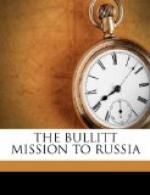Mr. Lloyd George referred to the objection that had been raised to permitting Bolshevik delegates to come to Paris. It had been claimed that they would convert France and England to Bolshevism. If England becomes Bolshevist, it will not be because a single Bolshevist representative is permitted to enter England. On the other hand, if a military enterprise were started against the Bolsheviki, that would make England Bolshevist, and there would be a Soviet in London. For his part, Mr. Lloyd George was not afraid of Bolshevism if the facts are known in England and the United States. The same applied to Germany. He was convinced that an educated democracy can be always trusted to turn down Bolshevism.
Under all circumstances, Mr. Lloyd George saw no better way out than to follow the third alternative. Let the Great Powers impose their conditions and summon these people to Paris to give an account of themselves to the Great Powers, not to the Peace Conference.
Mr. Pichon suggested that it might be well to ask M. Noulens, the French Ambassador to Russia, who had just returned to France, to appear before the meeting to-morrow morning, and give those present his views on the Russian situation.
President Wilson stated that he did not see how it was possible to controvert the statement of Mr. Lloyd George. He thought that there was a force behind this discussion which was no doubt in his mind, but which it might be desirable to bring out a little more definitely. He did not believe that there would be sympathy anywhere with the brutal aspect of Bolshevism, if it were not for the fact of the domination of large vested interests in the political and economic world. While it might be true that this evil was in process of discussion and slow reform, it must be admitted, that the general body of men have grown impatient at the failure to bring about the necessary reform. He stated that there were many men who represented large vested interests in the United States who saw the necessity for these reforms and desired something which should be worked out at the Peace Conference, namely, the establishment of some machinery to provide for the opportunity of the individuals greater than the world has ever known. Capital and labor in the United States are not friends. Still they are not enemies in the sense that they are thinking of resorting to physical force to settle their differences. But they are distrustful, each of the other. Society can not go on that plane. On the one hand, there is a minority possessing capital and brains; on the other, a majority consisting of the great bodies of workers who are essential to the minority, but do not trust the minority, and feel that the minority will never render them their rights. A way must be found to put trust and cooperation between these two.
President Wilson pointed out that the whole world was disturbed by this question before the Bolskeviki came into power. Seeds need soil, and the Bolsheviki seeds found the soil already prepared for them.




